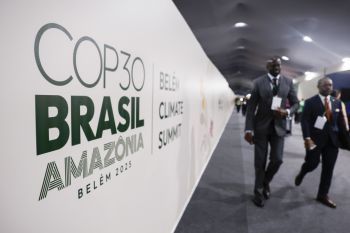COP30: A decade since Paris and a defining moment for global climate action
By: Lauren Sarruf
Last updated: Monday, 10 November 2025

COP30 takes place in Belém, Brazil, bringing global climate negotiations to one of the planet’s most vital ecosystems. Photo credit: Tânia Rêgo/Agência Brasil.
This month, the world’s attention will turn to Belém, Brazil, for the 30th United Nations Climate Change Conference (COP30). This pivotal summit marks ten years since the landmark Paris Agreement, a decade defined by both unprecedented progress and urgent calls for deeper, faster action.
Each year, the Conference of the Parties (COP) brings together governments, civil society, businesses, and experts under the UN Framework Convention on Climate Change (UNFCCC) to review global progress and negotiate next steps in tackling the climate crisis. But COP30 stands apart. More than a milestone, it’s a test of international resolve, an opportunity to demonstrate that promises made in Paris are translating into tangible results.
From 10–21 November 2025, countries will gather in the heart of the Amazon, to connect global action with local realities, in what the Brazilian presidency has called “Global Mutirão”,a collective mobilisation that invites not only national governments but also cities, regions, Indigenous groups, and communities to showcase real climate solutions.
Business School voices
Researchers from the University of Sussex Business School are reflecting on the challenges and opportunities this landmark summit presents, from connecting global energy ambitions to local realities, to rethinking how justice, innovation, and finance intersect in the race for climate action.
“One of the greatest challenges for COP30 will be connecting global energy transition ambitions with the everyday realities of those who remain excluded from its benefits,” says Kathlen Schneider, PhD Researcher in Science and Technology Policy Studies at SPRU. “The Brazilian Amazon generates around a quarter of the country’s electricity, yet nearly one million people there still live without reliable access to energy. It will be critical for COP30 to ensure that the voices and experiences of those living in the margins of Brazil’s renewable energy frontier are not only heard, but translated into real action toward clean, affordable, and reliable energy access.”
Professor Richard Tol, Professor of Economics, highlights the urgency of renewed national commitments: “Secretary-General Guterres has acknowledged that the 1.5°C target is likely to be missed. On its return to South America, I hope COP30 will return to the spirit of Lima and once again put Nationally Determined Contributions centre stage.”
For Dr Abbas Abdul, Research Fellow in Transformative Innovation Policy at SPRU, COP30 represents an opportunity to turn unity into delivery: “As I join COP30’s Global Mutirão, I lend my hands, voice, and data to a single purpose—scientists, workers, farmers, financiers, cities, and forests moving in step. From Belém to the world, we braid justice with innovation, Indigenous wisdom with investment, courage with compassion. Together we turn megawatts into livelihoods, emissions into ambition, and hope into habit.”
Climate initiatives at the Business School
Research driving impact
From reimagining global technology governance to understanding the social dimensions of net-zero transitions, researchers at the University of Sussex Business School continue to shape international climate conversations through cutting-edge scholarship.
Recent publications include:
Benjamin K. Sovacool, Laurence L. Delina, and Ben Martin.
Milli Keil, Felix Creutzig, and Nora Molkenthin.
Marie Josefine Hintz, Nikola Milojevic-Dupont, Felix Creutzig, Tim Repke,and Lynn H. Kaack.
Fangzhi Wang, Hua Liao, and Richard S.J. Tol.
Benjamin K. Sovacool, Patrick Devine-Wright, Sarah Mander, Jordan Rowley, and Stacia Ryder.
Finn Müller-Hansen, Livia Fritz, Sarah Lück, Benjamin K Sovacool, and Jan C Minx.
Andrea Käsbohrer, Karoline S. Rogge, and Hans-Martin Zademach.
Weimin Zhang and Benjamin K. Sovacool.

